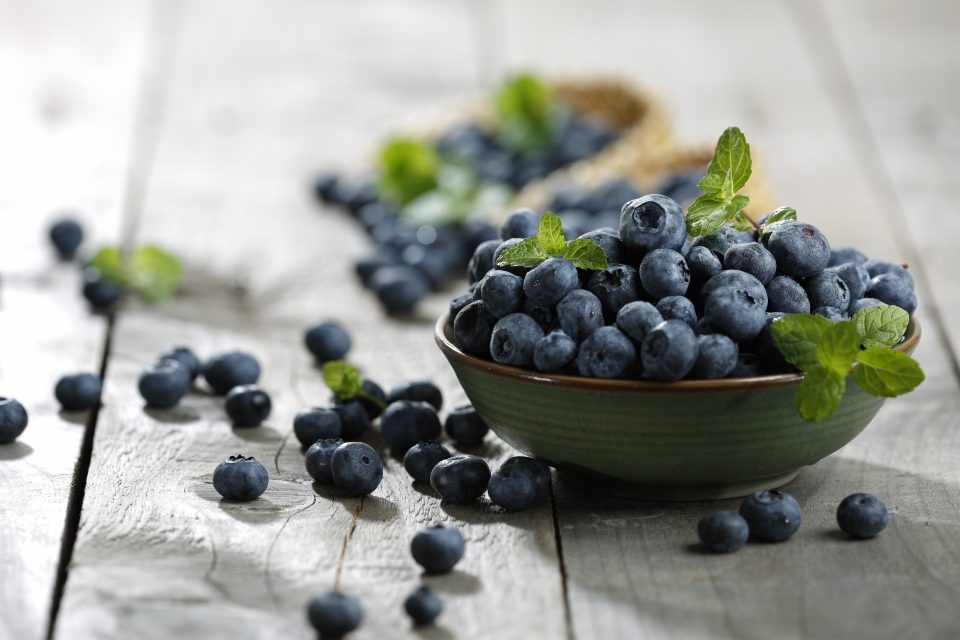
A recent analysis found that eating blueberries may be associated with positive cardiovascular benefits.
“Potential health benefits of blueberries may be due to vascular effects of anthocyanins which predominantly circulate in blood as phenolic acid metabolites. We investigated which role blueberry anthocyanins and circulating metabolites play in mediating improvements in vascular function and explore potential mechanisms using metabolomics and nutrigenomics,” researchers wrote in The Journals of Gerontology Series A.
The two-part study included 40 healthy participants. For one month, they received either a drink containing 200 grams of blueberries or a control drink. Researchers took participants’ blood pressure and measured their brachial arteries’ flow-mediated dilation (FMD). The other arm of the study evaluated the role of purified anthocyanins; comparing participants who drank anthocyanins with drinking blueberries or consuming a beverage with fiber, minerals, or vitamins similar to those found in blueberries.
Study finds eating 200 gm of blueberries a day for a month led to lower blood pressure.
Not sure how feasible it is to eat 1 to 2 cups of them a day, but given their disease-fighting antioxidants, it’s another win for the little blue gems! 🏆#wellbeinghttps://t.co/7aEEd07Pm7 pic.twitter.com/1qEPpZbh3O
— Carrie Rubin (@carrie_rubin) February 24, 2019
Instant Gratification?
The researchers found that blueberries provided benefits within two hours of consumption.
“Purified anthocyanins exerted a dose-dependent improvement of endothelial function in healthy humans, as measured by flow-mediated dilation (FMD),” they observed. “The effects were similar to those of blueberries containing similar amounts of anthocyanins while control drinks containing fiber, minerals, or vitamins had no significant effect.”
Delicious news: #Blueberries have so many #health benefits that some people call them "brain berries." Now a new study suggests that eating them may lower #HeartDisease risk by 20%, mainly by reducing blood pressure. https://t.co/wTZTpM06wj #wellness pic.twitter.com/ziM4vOmNgT
— Amy Doneen, DNP (@TheHASPC) February 21, 2019
Patients who consumed blueberries for one month increased their FMD and decreased their blood pressure by 5 mmHg. That type of decrease is normally achieved through medication, the researchers noted.
Fourteen of the 63 evaluated anthocyanin plasma metabolites were associated with acute FMD improvements, and 17 were correlated with chronic FMD improvements. Anthocyanin drinks resulted in improved endothelial function. The control drink, the fiber drink, and the vitamins and minerals drink did not largely impact FMD two and six hours after consumption.
Researchers have shown that less than a cup of wild blueberries can have an almost immediate and long lasting impact on how well your vascular system is circulating blood. The more easily blood flows, the less your heart has to work. https://t.co/bSQxZALJ3e #health #heartdisease pic.twitter.com/q8Jy3rGPwj
— Lori Shemek, PhD (@LoriShemek) April 15, 2018
“Daily blueberry consumption led to differential expression (>1.2-fold) of 608 genes and 3 microRNAs, with Mir-181c showing a 13-fold increase in peripheral blood mononuclear cells,” the study authors observed.
The researchers concluded that the anthocyanin metabolites play a significant role in vascular function that is most significantly observed when consuming an entire blueberry.
“Although it is best to eat the whole blueberry to get the full benefit, our study finds that the majority of the effects can be explained by anthocyanins,” said lead study researcher Ana Rodriguez-Mateos, PhD, of the Department of Nutritional Sciences at King’s College London, in a press release.
Blueberries are considered a superfood due to their anthocyanins, natural compounds that act as anti-oxidants fighting off free radicals that can contribute to cancer. Also, some studies suggest that people who regularly consume blueberries have a lower risk of heart disease. pic.twitter.com/fH1JEtNj88
— Beth Frates MD (@BethFratesMD) July 10, 2018
“If the changes we saw in blood vessel function after eating blueberries every day could be sustained for a person’s whole life, it could reduce their risk of developing cardiovascular disease by up to 20%.”
Sources: The Journals of Gerontology Series A, Medical News Today







 © 2025 Mashup Media, LLC, a Formedics Property. All Rights Reserved.
© 2025 Mashup Media, LLC, a Formedics Property. All Rights Reserved.